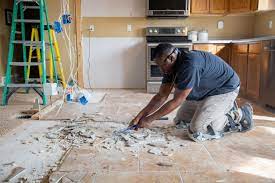Introduction
Embarking on home improvement projects can be exciting, but it’s essential to approach them with caution and careful planning to avoid costly mistakes. In this article, we’ll discuss ten common home improvement mistakes that homeowners should avoid to ensure successful renovations and upgrades.
Lack of Proper Planning
One of the biggest mistakes homeowners make is diving into a home improvement project without adequate planning. Whether it’s a minor renovation or a major remodel, proper planning is crucial for a successful outcome. Take the time to create a detailed plan and timeline, considering factors such as budget, materials, and labor.
Ignoring Budget Constraints
Another common mistake is ignoring budget constraints and overspending on home improvement projects. It’s essential to set a realistic budget and stick to it to avoid financial strain. Prioritize expenses and allocate funds accordingly, focusing on essential upgrades that add value to your home.
Skipping Research
Research is key to the success of any home improvement project, yet many homeowners skip this crucial step. Take the time to research materials, contractors, and permits before starting a project. Gather information from reliable sources and make informed decisions based on your findings.
Underestimating DIY Projects
While DIY projects can be rewarding, many homeowners underestimate the complexity of certain tasks and end up in over their heads. Assess your skills and limitations honestly and know when to DIY and when to hire a professional. Attempting projects beyond your expertise can lead to costly mistakes and delays.
Overlooking Safety Precautions
Safety should always be a top priority during home improvement projects, yet many homeowners overlook basic safety precautions. Always follow safety guidelines and use protective equipment when necessary. It’s better to err on the side of caution than to risk injury or accidents.
Ignoring Permits and Regulations
Ignoring permits and building codes is a recipe for disaster in home improvement projects. Before starting any renovation, make sure you have the necessary permits and approvals from local authorities. Failing to comply with regulations can result in fines, delays, or even legal issues down the line.
Choosing the Wrong Materials
Selecting the right materials is crucial for the success and longevity of your home improvement project. Avoid the mistake of choosing subpar materials to save money upfront, as they may cost you more in the long run. Invest in quality materials that are suitable for your project and will withstand the test of time.
Not Considering Future Resale Value
Many homeowners make the mistake of prioritizing their personal preferences over resale value when making renovation decisions. While it’s essential to create a home that reflects your taste and style, consider how your choices will impact resale value. Focus on upgrades that appeal to a wide range of potential buyers and add value to your home.
Neglecting Maintenance and Upkeep
Completing a home improvement project is only half the battle; the other half is maintaining the results. Neglecting regular maintenance and upkeep can undo all your hard work and investment. Make sure to follow recommended maintenance schedules and address any issues promptly to preserve the results of your renovations.
Rushing the Renovation Process
Rushing through a home improvement project is a surefire way to make mistakes and compromise quality. Take the time to do things right, even if it means extending the timeline. Patience is key when it comes to home renovations, so resist the urge to rush and prioritize quality workmanship.
Failing to Communicate with Contractors
Clear communication with contractors and subcontractors is essential for a successful home improvement project. Make sure to establish expectations upfront and maintain open lines of communication throughout the process. Address any concerns or issues promptly to ensure the project stays on track.
Ignoring Energy Efficiency
In today’s eco-conscious world, ignoring energy efficiency is a major home improvement mistake. Consider incorporating energy-efficient upgrades into your renovations, such as installing energy-efficient appliances or improving insulation. Not only will these upgrades save you money on utility bills, but they’ll also reduce your environmental footprint.
Overlooking Design Cohesion
Finally, overlooking design cohesion is a common mistake that can detract from the overall aesthetics of your home. Ensure consistency and harmony in design choices throughout your home improvement projects, from color schemes to materials and finishes. Cohesive design creates a sense of unity and flow, enhancing the overall look and feel of your space.
Conclusion
Avoiding these ten common home improvement mistakes can save you time, money, and frustration in the long run. By approaching renovations with caution, thorough planning, and attention to detail, you can achieve the results you desire and create a home that reflects your style and personality.

